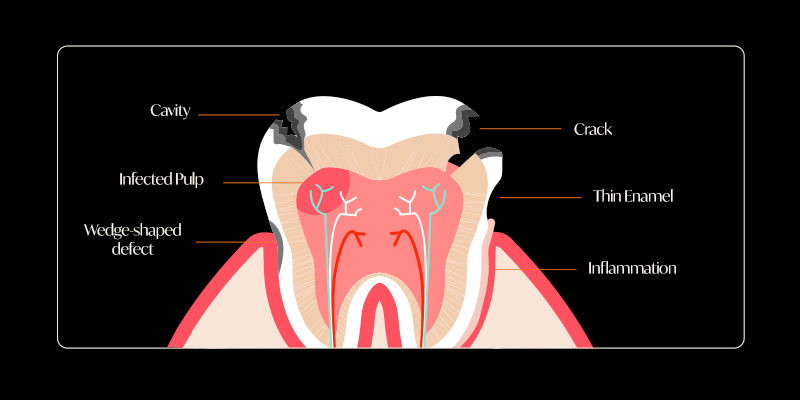Book an appointment
or ask a question
Leave your details here and a member of our team will be in touch momentarily.
Emergency Dental FAQs
To find an emergency dentist, the best way is to call your regular dentist or Google ‘emergency dentist near me’. This will help you get in touch with dental practices closest to you that offer emergency dental care.
If you need to have dental treatment right away to stop bleeding, alleviate discomfort, or prevent tooth loss, it is most likely an emergency. A chipped tooth or a missing crown or filling are two examples of dental problems that are not considered emergency situations unless you’re in severe discomfort.
The most common dental emergency is a toothache. Toothaches can be caused by a variety of factors, including dental decay, gum disease, a cracked or broken tooth, an abscess, or even grinding or clenching of the teeth. Other common dental emergencies include knocked-out teeth, broken or chipped teeth, and objects stuck between teeth or gums. If you experience a dental emergency, it is important to seek prompt treatment from a dentist to avoid further damage or infection.
You should deal with a dental emergency quickly to alleviate pain, prevent infection, save your tooth, and avoid further damage. Delaying treatment can lead to more serious and potentially irreversible problems.
Determining exactly how much tooth pain qualifies as a dental emergency can be challenging because the severity of tooth pain can vary widely. To determine the severity of your tooth pain, you could observe some general guidelines:
· Sudden start of severe pain: If you suddenly develop significant tooth pain, it could be an indication of an urgent dental situation. This can be a sign of an abscessed tooth, a cracked or broken tooth, or other serious dental issues that need to be treated immediately.
· Continuous discomfort: It’s crucial to get dental care if you experience tooth discomfort that lasts for more than a day or two. This can indicate tooth decay, an infection, or other dental problems that need attention.
· Swelling or Fever: Fever and swelling around the affected tooth or gums are indications that you may have an abscessed tooth or another serious dental infection that needs immediate attention.
· Difficulty eating or drinking: If you have pain when consuming food or liquids, this could indicate a cracked tooth, a loose filling, or other dental issues that need to be addressed.
Overall, you should seek emergency dental care if you are experiencing tooth pain that is sudden, severe, persistent, accompanied by swelling or a fever, or that makes it painful to eat or drink. To avoid further issues, it is important to err on the side of caution and get dental care right away.
Emergency Appointments at Dr Wong’s practice
In order to help accommodate patients, we try to leave time during the day in case an emergency appointment becomes necessary.
At Dr Jaclyn Wong, we are dedicated to helping you maintain your natural teeth for life, and urge our patients to get in touch with us if they should experience any dental pain, trauma or major concerns.

